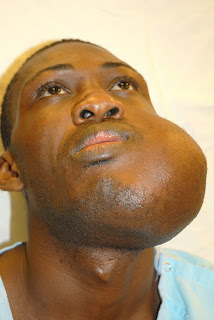The mother answered, “No, Odilon has no pain.” Veronique had no way of knowing that a small cyst, easily removed in a place with adequate medical care, would overtake both his mouth and his life. So, she returned to Cotonou and her family without giving it much more thought.
Veronique returned to Abomey two years later, and when she saw how much the tumor had grown, she was stunned. She asked Odilon’s mother, “Why haven’t you done something about your son’s problem?” His mother replied, “We have taken him many places, but no one can do it.”

Ten-year-old Odilon suffered intensely from the swelling mass on his jaw. The family visited doctors who said they couldn’t help and traditional healers who prescribed herbal drinks. Sometimes it was difficult for him to eat, and he often would spit up blood.
“He was a strong boy,” his grandmother says. “But the tumor made him weak and small.”
Physically he deteriorated, and he also became withdrawn and shy. He was quiet, unsmiling, and reluctant to answer questions. He was ridiculed by others for the softball-sized tumor that pushed at his cheek, absorbed his jaw and teeth, and kept growing as weeks and months passed.

“I was ashamed when I had the tumor,” Odilon says. “Children at school used to insult me. I did not know why I had this tumor, and I wondered where it came from.” The family suffered, too. People accused the father of doing nothing to help his son and of neglecting his child.
Back in Cotonou, his Aunt Veronique heard of a Mercy Ship on its way to Benin that could help Odilon. She called and told the family, and in February, Odilon and his grandmother traveled the five hours from their village to Cotonou. There he received an appointment for a free operation with Dr. Gary Parker, who has worked with Mercy Ships for 23 years removing tumors just like Odilon’s.

“Because of the tumor, he stayed in the house,” his grandmother says, “but he would cry that he wanted to go back to school. If he is healed, he can go to school, and then, by the grace of God, he will be someone in the future.”
Odilon’s feelings about being healed were more basic, immediate, and fitting for a ten-year old who has suffered physical pain and emotional isolation. He declared, “After the surgery, I will feel better, and people will not laugh at me again.”

In March, Odilon received his first operation to remove the tumor. Then a second surgery followed, in which Dr. Parker fashioned a new jaw for him using a titanium plate and pieces of Odilon’s rib. A small scar cuts across his chin, but the tumor is gone, and Odilon smiles readily. He holds his head higher, and he’s excited for the future.

“I am fine!” Odilon says, “…and when I see my face, it is good!”
Now Odilon would like to go back to school and become a doctor. “There are so many different diseases,” Odilon says, “and I will be able to help people feel better.”
“No one believed that he could have an operation that would work. No one else believed, because the surgery was too hard,” Veronique explains. “It’s been really a wonderful thing for the surgeons to do for Odilon, for all of us.”












